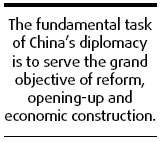Peaceful development is always our path
China realized a century-old dream by successfully hosting the Beijing Olympic Games. The International community widely believes the Beijing Olympics symbolizes that China has finally become a major, world-class country. It represents a crucial step in the nation's efforts to climb up the next stage in terms of comprehensive national strength.
One often hears people in the West ask if China will become aggressive and impose its own will upon other nations as it grows stronger. A veteran Western diplomat once said to me that whenever a difficult and thorny issue arises somewhere in the world people tend to expect China to come up with a workable solution.
The Chinese people have a clear idea of the country's strength, as 80 percent of the population believes China, with its per capita GDP ranking around 100th in the world and being only one-20th of the US' or UK's, still has a long way to go before becoming a world-class power. However, the history of development of international relations shows that a nation's international status and role in international affairs are determined by its economic aggregate and comprehensive national strength rather than on per capita GDP. China is now the fourth largest economy in the world and considered by some as the only country with the potential to challenge the "sole superpower" in the world - the United States of America. The fact that China won more gold medals than any other country did at the Beijing Olympiad shows yet again the country's ability to focus its resources on accomplishing great feats.
China's major power status is the result of continued all-out efforts by the whole nation through 30 years of reform and opening. The Beijing Olympic Games enabled the West to raise its expectations of as well as worries and concerns about China.

We need to let the world see clearly the main characteristics of China's diplomacy are peace and cooperation, and China will be powerful but never seek hegemony.
China has developed a set of diplomatic theory and practice centered on independence, self-decision, peace and cooperation in the past three decades. China will join other peace-loving forces in contributing to the progress of world peace.
Cooperation is a key means by which China achieves peaceful development, as we stand for resolving differences through dialogue and negotiation when handling international affairs. An example of success in China's diplomatic philosophy of peace and cooperation can be found in the handling of the Korean nuclear issue.
The fundamental task of China's diplomacy is to serve the grand objective of reform, opening-up and economic construction. As China's foreign trade expands across the globe, Chinese capital and enterprises entering overseas markets are gaining significance as an outstanding part of exchanges between the country and the rest of the world.
More than 40 million Chinese citizens travel overseas as tourists every year, while about 700,000 go for higher education in foreign countries or regions. The bond between China and the rest of the world is growing and so is the necessity for China to assume more international responsibilities.
The expansion of diplomatic pursuits from political security to all-round international affairs and further diversification of the subjects of foreign services are for the purpose of creating a stable environment of cooperation. China's cooperation with other members of the international community including Western nations will increase, but its diplomatic philosophy will not change.
Misguided public opinion is now a growing problem to China-West relations in the new era, as negative coverage of China by certain Western media outlets exerts an increasingly disruptive impact on cooperation between the two sides. Some westerners are deeply biased against socialist China and simply incapable of being objective when it comes to China. Hence their tendency to always view China from an angle that reflects their own environment and outlook and inability to analyze China's problem in the context of development and its unique national conditions. Also, the pool of information about China the Western society has today is relatively short on truthful accounts and suffers from a serious imbalance.
We invited some 30,000 journalists from around the world for a panoramic and in-depth coverage of the Beijing Olympics and China. This undoubtedly helped the rest of the world know the country better. Many of the Western journalists I met recently were full of praises about what they saw and experienced in China and realized they did not really know much about the country.
The Beijing Olympiad cannot change Western media's mind completely, but it can to a certain extent bring them out of the confines of their outdated impressions and encourage them to learn more about a developing China.
The media occupies a very important place in Western politics. As China's openness increases and attracts more and more attention from around the world, crossovers between domestic and foreign affairs are becoming increasingly obvious. The media plays a unique role between the two major fronts of domestic and foreign affairs and is therefore one of the focal points of China-West interactions.
For the sake of protecting China's international image and improving the China-West cooperative relationship, we need to persist in winning Western society's better understanding of our national conditions and our determination to follow the path of peaceful development. China must carry on its own development while integrating itself and interacting with the rest of the world. The past three decades saw China overcome many twists and turns in its quest for reform and opening-up without backing down at any difficult juncture. Looking ahead, China will no doubt achieve sustained development amid increased mutual opening between the country and the rest of the world.
The author is Chinese ambassador to the United Kingdom.
(China Daily 10/15/2008 page8)














